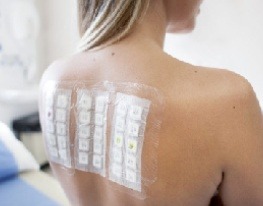About Us


A patch test will be undertaken to determine the exact allergen(s) which are responsible for your allergic skin reaction.
Patch Test
Your dermatologist suspects that you are allergic to one or more chemical, metal, cosmetic, dye, fragrance etc. A patch test will be undertaken to determine the exact allergen(s) which are responsible for your allergic skin reaction. This investigation and its protocol are US FDA approved.
Here a sticker containing 20 aluminum discs of 8 mm diameter is pasted to the skin on the back. Each disc contains a separate allergen. These 20 allergens cover the range of over 5000 materials or products that one might be allergic to.
The sticker is taken off after 2 days and the patch sites will be marked with a skin- marking pen. Reading is taken on the 2nd and 4th day.
- You cannot shower or do any work or exercise that will wet or loosen the patches. Have a sponge bath and not a shower bath, so that the back can be kept dry. You can have a shower after the 2nd day's reading, but avoid using soap/scrubs on your back till the 4th day's reading has been taken.
- You may develop itching under the patches. If it becomes very severe or if you develop irritation (this happens rarely), you should contact your dermatologist. If you are unable to contact the clinic, have someone carefully remove the painful patch. Try not to disturb the other patches.
- You will be tested for your response to common chemicals. If you believe that your problem is worsened by any agent or product, even a medication, please bring it with you (and the container with the ingredient list) when you come for patch testing.
- You should not be tested if you are taking cortisone pills (e.g. prednisone), anti-histamine pills (Xevor, Atarax, Allegra, Cetirizine), have had a steroid injection, are applying steroids to your back, or have had sun on your back recently. Please tell the nurse or doctor if any of these have occurred.
- Keep sunlight and other sources of ultraviolet (UV) light off the skin being tested. So, keep a shirt on when outdoors for the duration of the test.
- Please tell your doctor if you are pregnant.
- Patch tests are not the same as skin prick tests which are sometimes used to diagnose other types of allergy.
- Patch testing cannot find the cause for atopic eczema. However, many children with atopic dermatitis may also have a secondary contact dermatitis, which can be detected by this test. This test is performed if a child with atopic dermatitis has recurrent rashes in one particular part of the body, which is not responding well to treatment.
